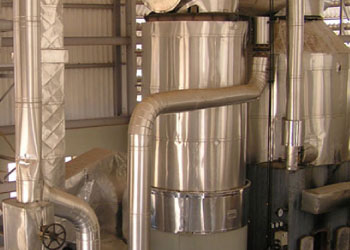
-
-
CALL US NOW
+91 78600 24711

Thermic fluid heaters are emerging as one of the most reliable and eco-friendly options for providing heat in various industrial processes. These heaters offer several advantages that make them a top choice for businesses looking to reduce their carbon footprint while maintaining optimal performance.
Thermic fluid heaters work by circulating a heat transfer fluid (HTF) through a closed-loop system. The fluid absorbs heat from the burner and carries it throughout the system to maintain consistent temperatures. This method of heating is more efficient and safer compared to traditional methods like steam boilers, which often waste energy and require high maintenance.
Energy Efficiency:
Thermic fluid heaters can operate at a high thermal efficiency rate of around 85-90%, compared to traditional steam boilers, which often struggle to reach 80%. This high efficiency ensures that less fuel is required for the same heating output, leading to cost savings for businesses. Furthermore, they help in reducing greenhouse gas emissions by using less energy, making them a sustainable option for the environment.
Lower Carbon Footprint:
As industries move towards greener solutions, reducing carbon emissions has become a priority. Thermic fluid heaters emit fewer pollutants than conventional heating systems. According to studies, using a thermic fluid heater can cut down carbon dioxide emissions by up to 25%. This is a huge step towards sustainable industrial heating solutions.
High Temperature Range:
Thermic fluid heaters are known for their ability to operate at high temperatures, up to 300°C, without increasing pressure. This makes them suitable for various industries such as chemicals, pharmaceuticals, food processing, and textiles, where high-temperature processes are necessary. The ability to maintain high temperatures without additional pressure also enhances safety and reduces the risk of accidents.
Reduced Maintenance Costs:
Traditional heating systems require regular maintenance to prevent breakdowns. On the other hand, thermic fluid heaters have fewer moving parts, reducing the need for frequent repairs and maintenance. Their durability and low-maintenance nature save companies money in the long run, making them a cost-effective solution for industrial heating.
Thermic fluid heaters are indeed the future of sustainable heating solutions. Their ability to provide high efficiency, low emissions, and reduced maintenance costs makes them an essential tool for industries looking to become more eco-friendly. As a leading Thermic Fluid Heater manufacturer in Uttar Pradesh, Thermodynamic Services offers high-quality heaters designed to meet the needs of industries while minimizing their environmental impact. Embracing thermic fluid heaters means investing in a cleaner, more sustainable future for industrial heating.